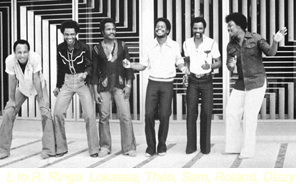|
 African All Stars, influential but short-lived Congolese rumba band, formed 1978; disbanded 1979. Théo Blaise Kounkou (born Brazzaville, 1949; vocal), Lokassa ya Mbongo (born Kinshasa, 1946; guitar), Dizzy Mandjeku (born Kinshasa, Aug. 20, 1946; guitar), Sam Mangwana (born Kinshasa, Feb. 21, 1945; vocal), Ringo Moya (born Kinshasa, 1953; died Paris, Apr. 1993; drums), Roland M'vogo (born Cameroon, bass). African All Stars, influential but short-lived Congolese rumba band, formed 1978; disbanded 1979. Théo Blaise Kounkou (born Brazzaville, 1949; vocal), Lokassa ya Mbongo (born Kinshasa, 1946; guitar), Dizzy Mandjeku (born Kinshasa, Aug. 20, 1946; guitar), Sam Mangwana (born Kinshasa, Feb. 21, 1945; vocal), Ringo Moya (born Kinshasa, 1953; died Paris, Apr. 1993; drums), Roland M'vogo (born Cameroon, bass).
Band formed in Abidjan, Côte d'Ivoire, where a number of Congo-Kinshasa (Zaire) musicians, disillusioned with economic and political conditions at home, had gone to seek a fresh start. Mangwana, Lokassa, Mandjeku and Moya, four veterans of Tabu Ley's band, Afrisa, joined with Congo-Brazzaville's Kounkou and Cameroonian M'vogo to launch their new band.
The All Stars felt Congolese dominance of African pop music to be under threat from pressing plants at home, idled by lack of raw materials and spare parts, and from a certain absence of artistic innovation. It was the time of "Sweet Mother" from Nigeria's Prince Nico Mbarga, who fashioned a mixture of West African highlife and Congolese-style guitars into a world-wide hit. To counter Mbarga's challenge, the All Stars speeded up the rumba (Congolese music's base) and de-emphasized conventional Lingala lyrics in favor of more widely understood French and English.
With help from a Nigerian producer, the players traveled to Lagos in the middle of 1978 where, in little more than twenty-four hours, they recorded enough material for three albums: Sam Mangwana et l'African All Stars, Les Champions, and Zeneba. Most of the songs incorporated the speeded-up "new beat," but a laid-back rumba called "Georgette Eckins" produced the session's runaway hit. The All Stars played concerts along the West African coast and, while in Ghana in early 1979, recorded four albums of new material: Est-ce Que Tu Moyens?, M'banda Kazaka, Mamadou, and Suzana Coulibaly. A faster, "new beat" song, "Suzana Coulibaly," produced the biggest hit of these sessions.
Also in 1979, the group moved its headquarters from Abidjan to Lomé, Togo, where it was joined by three additional guitarists from Kinshasa: Pablo Lubadika, Bopol Mansiamina, and Syran M'Benza. By then, however, dissension had begun to mount. After recording a final album, Matinda, in Lagos, the African All Stars broke up, ending a brief but extraordinarily creative year of existence. A reunion of Lokassa, Mandjeku, Mangwana, and Moya in 1982 produced three new albums—Affaire Video, N'simba Eli, and Bonne Année—under the African All Stars name, but all lacked the fire and spontaneity of the group's original work.
Despite its brief existence, the African All Stars proved to be tremendously influential. They demonstrated to other musicians that there could be artistic life outside of Kinshasa and Brazzaville. Most of the players—Bopol, Lokassa, Théo Blaise, Syran, Ringo Moya, Pablo, and Mangwana—went on to form the backbone of the evolving Paris base of Congolese music production. And the group's speeded-up "new beat" helped inspire the fast-paced Paris sound that came to be known as soukous.
© 2011 Gary Stewart
SELECT DISCOGRAPHY
Georgette Eckins (Sonodisc CDS 7002) seventies recordings reissued 1996; Sam Mangwana et l'African All Stars (not the album referred to in above text, Ngoyarto SM 010) eighties reunion recordings reissued 1996.
SELECT BIBLIOGRAPHY
G. Stewart, Rumba on the River (London and New York, 2000).
|

